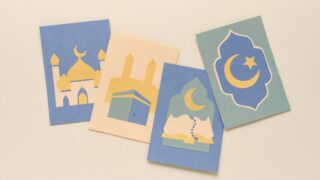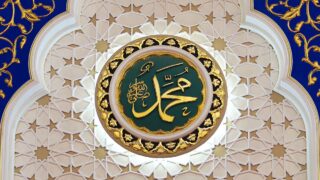Wisdom of Jesus & Muhammad (peace be upon them)
Like the Prophet Muhammad, Jesus simply provided his followers a guide on how to become decent God fearing people.
Many mistakenly believe that Muslims were taught not to tolerate the existence of other religions present in this world.
In fact this belief contradicts the very essence and teachings of being a good Muslim where we can witness the dealings of the Prophet Muhammad (peace be upon him) with other religions described in the Quran where the verse reads:
{To you be your religion, to me be mine.} (109:6)
Here, we see the Prophet Muhammad’s tolerance of other faiths where Islam recognizes that there is a plurality of religions on this earth, and gives the right to individuals to choose the path which they believe to be true.
The Prophet highlights that religion is not to be, and was never, forced upon an individual against their own will. In all reality and contrary to allegations, the Quran promotes religious tolerance and sets the guideline for the Muslims’ interaction with people of other faiths. God says:
{There is no compulsion in religion.} (2:256)
The best example of the tolerance by Prophet Muhammad to other religions may be illustrated during the time where he migrated to Madinah, where he worked to ensure harmony and stability in a society which once had been distraught by decades of war, calling for the peaceful coexistence of Muslims, Jews, Christians and polytheists.
It is on this note that he laid down a ‘charter’ which detailed the responsibilities of all parties which resided in Madinah, including their obligations towards each other, and certain restrictions which were placed on each. All involved were to obey what was mentioned therein, and any breach of its articles was regarded as an act of treachery indicating that mutual respect of each other’s religions was during this time significant. Similarly much respect and focus was expected to the sayings of the Prophet Jesus.
Words of Jesus in the Quran
The Quran is replete with many stories about the life and teachings of Jesus. There are in fact recalling of his miraculous birth, his teachings, the miracles he performed by God’s permission, and his life as a respected Prophet of God. The Quran continues to repeatedly remind us that Jesus was a human Prophet sent by God, not part of God Himself.
Raised in a non-Muslim country, many were surprised to see me referring to the sayings of the Prophet Jesus. We as Muslims are taught that Islam’s view of Jesus lies between two extremes. That of the Jews, who rejected Jesus and sadly labeled him as an imposter while the Christians, on the other hand, considered him to be the son of God and worship him as such.
Islam considers Jesus in addition to Noah, Abraham, Moses and Muhammad (peace be upon them) to be one of the greatest and most forbearing of Prophets. The great reverence to which Jesus is held lies in conformity with the Islamic view of the Oneness of God, the Oneness of Divine guidance, and the complementary role of the subsequent mission of God’s messengers.
Jesus has in fact described himself in the Quran:
{I am indeed a servant of God. He has given me revelation and made me a prophet;
He has made me blessed wheresoever I be; and He has enjoined on me prayer and charity as long as I live. He has made me kind to my mother, and not overbearing or miserable.
So peace is on me the day I was born, the day that I die, and the day that I shall be raised up to life (again)!’
Such was Jesus the son of Mary. It is a statement of truth, about which they (vainly) dispute.
It is not befitting to (the majesty of) God that He should beget a son. Glory be to Him! When He determines a matter, He only says to it, ‘Be,’ and it is.} (19:30-35)
Jesus Wise Sayings
It is on this note that referring to Jesus’ wise sayings I was able to have a common foothold with friends when relating to anything religious as we could, to an extent, see eye to eye. One wise saying by Jesus was:
“Do not speak much without remembering God, for by doing so, you harden your hearts. Surely a hard heart is distant from God though you are unaware.
Do not, like lords, look at the faults of others. Rather, like servants, look at your own faults.
In truth, humanity is comprised of only two types, the afflicted and the sound. So show mercy to the afflicted, and praise God for well-being.” (Muwatta’ Malik, 8)
There is a similar verse in the Quran where Jesus announces he comes with clear signs:
{Now I have come to you with Wisdom, and in order to make clear to you some of the (points) on which you dispute. Therefore, fear God and obey me. God, He is my Lord and your Lord, so worship Him – this is a Straight Way. But sects from among themselves fell into disagreement. So woe to the wrongdoers, from the penalty of a Grievous Day.} (43:63-5)
Jesus was also known to have said:
“Virtuous action does not consist in doing good to someone who has done good to you – that is merely returning a favor. Virtuous action consists in doing good to those who have wronged you.” (Ahmad)
A beautiful example of forgiveness, sacrifice and altruism by our beloved Jesus and an important ingredient in becoming a decent practicing Muslim in doing as what you would be done by.
Reading through excerpts from Walk on Water: The Wisdom of Jesus, translated by Hamza Yusuf, we are awakened by the real reason of why we are in this world and how we should act with others. Through the current challenges I face, I was personally reminded of how we should respond, and how to continue in our daily lives despite the confrontations. Even in times of bliss and contentment we are guided on how to act showing mercy to others. It is on this note that I was prompted to try to improve myself and my children for I am responsible for raising them.
One of Jesus’ wise saying which hit home read:
“It is of no use to know something if one does not act upon it. In truth, an abundance of knowledge only increases one in pride if one does not act accordingly.” (Ahmad)
Like the Prophet Muhammad, Jesus simply provided his followers a guide on how to become decent God fearing people warning us about greed, teaching us about altruism, and reminding us about ‘zuhd’ which entails abandoning whatever of this world that does not bring about benefit in the Hereafter.
Discussing greed he indicated:
“Love of this world is the source of every wrong action, and there is much harm in wealth.”
They asked: “What is its harm?”
Jesus replied: “Its possessor is never safe from pride and arrogance.”
They said: “What if he is free of those two? Is there still harm?”
Jesus responded: “Yes, for by nurturing his wealth, he is diverted from the remembrance of God.” (Ahmad)
Here, he highlights the importance of remembering God first and foremost warning that greed may weaken the heart filling it with pride and arrogance.
This is shown again here where Jesus states:
“O Spirit of God, inform us about the nature of wealth.”
He answered: “The possessor of wealth always has one of three qualities: he either gains it by unlawful means, obstructs it from reaching the one who deserves it or by accumulating it is destructed from worship of his Lord.”
In turn, on the subject of greed, the Prophet Muhammad has been reported saying:
“If a son of Adam were to own a valley full of gold, he would desire to have two. Nothing can fill his mouth except the earth (of the grave). Allah turns with mercy to him who turns to Him in repentance.” (Al-Bukhari and Muslim, 23)
Jesus also warned about the love of this life stating:
“Love of this world and love of the next world can never reside in the heart of a believer simultaneously, just as fire and water cannot be contained in a single vessel at the same time.”
And again in the quote:
“Woe to the possessor of this world, since he must die and leave the world behind. He places his hope in it and is deceived. He trusts it and is forsaken.”
In Islam we have been taught by Prophet Muhammad that none of us truly believes until he loves for his brother what he loves for himself. This altruism, this selfless act done for another’s benefit in spite of oneself, is a humanitarian endeavor praised by all societies. Equally so, we can read in wise sayings quoted by Jesus who advised to “love thy neighbor and to care for one and all”.
While ‘zuhd’ or what we can describe as abandonment does not imply a disregard for this world it can be defined as residing in the heart, and is practiced by ridding the heart of enslavement from the unnecessary desire and the over-attentiveness to things that are temporary.
Both the Prophets Muhammad and Jesus highlighted its significance and both practiced it since it was God’s will to pay less attention to this life and to pave for the Hereafter. Prophet Muhammad cited:
“When Allah desires goodness for his servant, He grants the capacity of abstention from materialism, a desire for the Hereafter and an insight into his own faults.”
Similarly, Jesus has quoted:
“Abstention from materialism revolves around three days; yesterday, which has passed and from it you should seek admonition/ learn a lesson; today, in which you should increase your preparation; Tomorrow of which you know not what it holds.”
In fact Jesus (peace be upon him) was the epitome of altruism where he would walk bare-footed, claiming nothing in the way of shelter, finery, wares, garments, or money of which he would procure only enough to subsist for the day.
As a child I understood that Jesus’ wise sayings were many and he was a true example for both Muslims and non-Muslims alike to follow. Despite the differing perspectives on Jesus’ life and teachings, I was taught that his spiritual legacy, as a righteous and principled guide, and his renowned mission for peace on Earth offered me an alternative opportunity to recognize the shared religious heritage between Christians and Muslims alike.
This is reflected in the Quranic verse which reads
{Say: ‘We believe in God and the revelation given to us and to Abraham, Ismail, Isaac, Jacob, and the Tribes, and message given to Moses and Jesus, and that given to (all) Prophets from their Lord. We make no distinction between any of them, and it is unto Him that we surrender ourselves.} (2:136)
This reaffirms God’s eternal message of spiritual unity reminding us all and myself foremost of the Prophet Muhammad’s saying:
“People from the time of Adam onwards are as equal as the teeth of a comb. Arabs are not superior to non Arabs, nor are red skinned people better than blacks. No superiority or virtue exists except in terms of piety.” (Al-Bayhaqi)
A beautiful reminder which I have printed and posted for all in my home to see, a reminder that we have to be our best, and continue to do our best since our actions will be the defining point on the day of Judgment as taught by our beloved prophets Muhammad and Jesus (peace be upon them).
By Deana Nassar
First Published: December 2013.


















